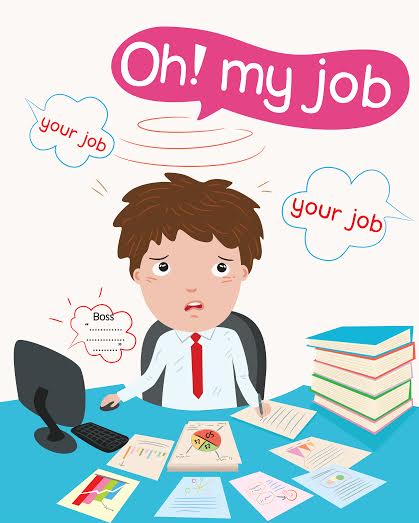
 Have you ever wondered why you are not progressing in your career as swiftly as others or why you always seem to be ignored when it comes to raises, promotions or important tasks?
Have you ever wondered why you are not progressing in your career as swiftly as others or why you always seem to be ignored when it comes to raises, promotions or important tasks?
In a typical day at the office, with your long list of things to do, I bet you will be able to only complete about 5% of all your tasks -- right? What are the things you should stop doing to be happier at work and have a more productive career? Make it a point today to identify some of the obstructions you are facing with your work or career and take a step to get past them.
Here are a few things to avoid doing for better career and life gratification:
Avoid putting off. Ignoring sensitive issues in office or pretending they don’t exist may only buy you some time. If a problem really exists and you ignore it, that problem will not go away. It will only get bigger. The long-term effects may throw up severe and irreversible situations later and devastate your professional life just because you did not address it in a timely manner. If you see the faint signs of any horns growing, take the bull by these horns and confront it head-on to ‘kill’ it. Deal with it and disable its rise promptly to cut short its potential for later and more damage.
Avoid over-focus on work. You work for a living, not the opposite. Therefore properly balancing your professional commitments with life’s personal obligations is critical to the quality of your work output. You have to establish a good work-life balance and not become so work-centric that there is nothing else in life for you. You need to be equally committed to family, friends or other interests and have something else to look forward to. Re-allocate your time so that you can go into work refreshed after enjoying your personal time.
Avoid indiscriminate confiding. Do not confuse your personal friendships with inter-colleague relations because the two are quite different and separate in nature. Remember that colleagues function in a competitive career environment and all colleagues are not necessarily your close friends, although they may appear to be. Therefore maintain general office relationships as purely professional and keep some distance from colleagues and don’t confide everything to everybody. Stay impersonal and you will not be open to unexpected surprises from colleagues’ reactions.
Avoid rumors and politicking. One of the most common causes of interpersonal problems is gossip and politiking. These do no good to anybody and are part of a harmful game in which you have to survive. Stay away from the grapevine that spreads negative information about colleagues by showing disinterest and dismissal. When the trouble makers realize you are not going to participate, they will leave you alone.
Avoid carrying your problems everywhere. Just as you shouldn’t carry your office home, you should never do the reverse as well. Bad moods are highly infectious, and if you go to work carrying the irritations of a domestic problem, you will quickly spread your bad mood around, and the stress will affect others. Keep your personal problems out of office and spare colleagues from the burden of sharing these. Instead lean on someone else’s good news to cheer up and relieve your own tensions.
Avoid anger-driven responses. However bad the irration, consciously control anger and never let it drive your actions. Anger is a dangerous and damaging impulse to give into, however much it may feel good at that time because you will invariably take wrong decisions that you will regret later. A typical negative emotion driven decision like quitting a job without an alternative lined up can be a long term problem. Therefore at all costs, avoid angry confrontation with peers or superiors and even your subordinates. Control your anger and your emotions to overcome the problem in a sensible cooler manner.
Avoid lying. If at all, only occasional “little white lies” of no consequence are all that may be overlooked, but any blatant lying is strictly a ‘no go’. Remember that one lie will lead to another cover-up lie and it will go on compounding. If you are protecting someone at office, do it in a way that the consequences don’t rebound on you.
Avoid griping. If you hate your job, you are not alone. But look around you and you won’t find people always groaning over their problem all the time. So neither should you. Do not blame your boss or colleague you don’t like every time something doesn’t go your way. If it’s something personal, then it’s all the more reason you should keep it to yourself and not gripe to others to express your frustration.
Avoid blame. Stop finding fault and blaming a colleague or subordinate for everything or anything that goes wrong. Rather than blaming someone which does nothing to resolve a problem, be positive and think of a solution of how the problem can be fixed.
Avoid expecting fair play. Not everyone plays fair. Being naïve about fair play will only wound your sensitivities and create bitterness. You must learn to accept that all is fair in office and unfairness is the only reality of your work life.
The above ‘to-dos’ are a prescriptive guide to help you get around at work overseas and enable you to achieve what you have really set out to achieve. Following these tips will enable you to stay on the good side of people and will also give you an entertaining understanding of why certain colleagues who go about doing things unthinkingly, stumble in time.


.jpg)

